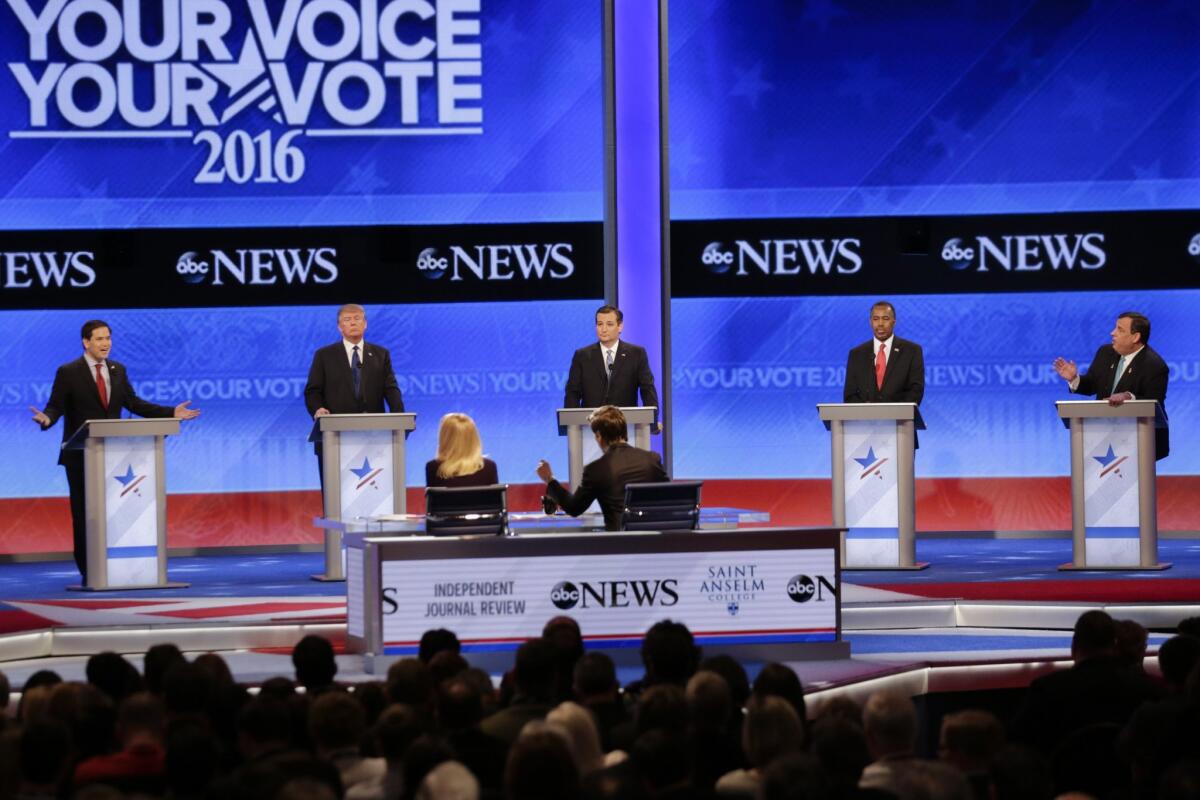Editorial: Why doesn’t California, the world’s eighth-largest economy, have a real say in the primaries?

Republican presidential candidates spar at the St. Anselm College GOP debate on Feb. 6, in Manchester, N.H.
- Share via
Iowans have caucused. New Hampshirites have cast their primary ballots. South Carolinians are now mingling with the men and woman who want to be the next president of the United States. And Californians? When will residents in the most populous state and the eighth-largest economy in the world get to choose among the candidates? On June 7 — the absolute last day of state presidential primaries. They’ll be lucky if there is still a choice to be made.
It wasn’t always like this. In 2008, California mattered because lawmakers scheduled a super early Feb. 5 presidential primary. As a result, Hillary Clinton talked about foreclosure assistance in Compton, Barack Obama championed childcare tax credits to mothers in San Francisco and John McCain wooed voters with Gov. Arnold Schwarzenegger in San Diego. Both parties hosted debates in California that year — the GOP at the Ronald Reagan Presidential Library in Simi Valley and the Democrats at the Kodak Theatre in Hollywood. The Times called it “candidates gone wild” in Southern California.
And voters responded. A record 9 million votes were cast in the primary, an increase of 2.4 million over the 2004 primary.
The price of participation, however, was steep. California spent nearly $100 million on the February presidential primary, which was held in addition to the regularly scheduled June primary. And four years later, Gov. Jerry Brown and lawmakers abandoned the race for relevance. A state law passed in 2011 moved the presidential primary back to June, on the grounds that it was too expensive and too complicated to schedule an early primary.
And look where that has gotten us. California is now on the sidelines and all but ignored by the candidates (except for when they drop in to fundraise from the state’s numerous billionaires and their friends). It’s impossible to know whether an earlier California primary might have persuaded Donald Trump to tone down his racist rhetoric about Mexicans, whether Bernie Sanders would have tempered his pitch for higher taxes in a state with one of the highest tax burdens, or whether any of the candidates would have talked more about climate change, affordable housing, renewable energy or transportation infrastructure if they had to campaign in California. But they might have.
California is on the sidelines and all but ignored by the candidates (except for when they drop in to fundraise from the state’s numerous billionaires and their friends).
Some California pundits suggest (or hope) that the sheer number of GOP candidates this year and the surprisingly close race between Sanders and Clinton could drag out the current primary season to June. Even if that happens, though, the number of candidates is rapidly decreasing, and voters will have to select from a much narrower field in June than they would have had several months earlier.
But there are other choices. California could move up not just its presidential primary, but its state and local primaries as well, as it did during the 1996, 2000 and 2004 elections in an attempt to make the Golden State a bigger player. Admittedly, it didn’t work out perfectly back then, because other states also bumped their elections up, setting off an arms race that resulted in a compressed, front-loaded primary season that limited the vetting of candidates and overemphasized fundraising and television ads. After the 2008 election, the Democratic and Republican National Committees adopted rules to discourage states from holding primaries before March by giving those that do so fewer delegates at the party’s nominating convention. This year, 12 states have primaries or caucuses set for March 1.
The concern among some political observers is that cramming primaries into February and March makes it harder for lesser-known or modestly financed candidates to compete, or to gain momentum through state-by-state campaigning. That’s a valid issue. But the other concern is that the primary season often effectively ends after the first Tuesday in March, meaning voters in late states have no real voice.
State lawmakers ought to move California’s primary — presidential, state and local — back to March in future presidential election years. Voters and local candidates can manage the change. But California Republican and Democratic party leaders also should advocate for significant changes to the primary system, such as rotating primaries in which states (or regions) would hold their primaries at different times in the cycle from presidential year to presidential year. The status quo doesn’t serve Californians.
Follow the Opinion section on Twitter @latimesopinion and Facebook
More to Read
A cure for the common opinion
Get thought-provoking perspectives with our weekly newsletter.
You may occasionally receive promotional content from the Los Angeles Times.









